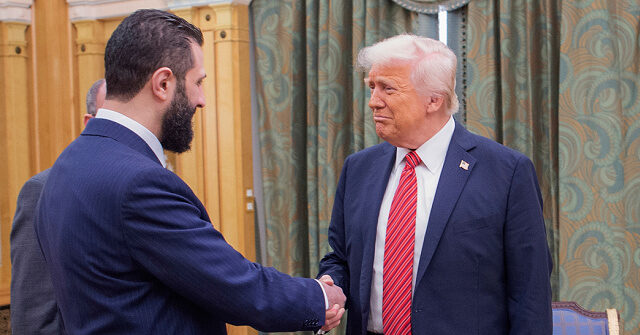The Trump administration on Tuesday officially revoked the Foreign Terrorist Organization (FTO) designation for Hayat Tahrir al-Sham (HTS), the Syrian rebel group and former al-Qaeda faction that toppled dictator Bashar Assad in December and took control of Damascus.
Secretary of State Marco Rubio said the revocation of FTO status fulfilled a promise made by President Donald Trump in May, when he met with HTS leader and interim Syrian president Ahmed al-Sharaa in Saudi Arabia.
“Tomorrow’s action follows the announced dissolution of HTS and the Syrian government’s commitment to combat terrorism in all its forms,” Rubio said in a statement released Monday.
“This action also builds on the momentum of the June 30 Executive Order ‘Providing for the Revocation of Syria Sanctions’ and recognizes the positive actions taken by the new Syrian government under President Ahmed al-Sharaa,” he added.
“This FTO revocation is an important step in fulfilling President Trump’s vision of a stable, unified, and peaceful Syria,” Rubio concluded.
Trump placed a great deal of trust in Sharaa’s promise to run a stable, secure, inclusive, and Western-friendly government. He praised Sharaa in May as a “young, attractive, tough guy” with a “very strong past” as a “fighter” who had “a real shot at pulling it together.”
Trump said sanctions leveled against the Assad regime had to be lifted for reconstruction to begin – and to alleviate the massive humanitarian crisis created by the brutal civil war that began in 2011. He placed Rubio in charge of evaluating sanctions and determining how they could be suspended.
This process included a review of whether or not the FTO designation against Sharaa’s HTS, which has effectively become the ruling party of Syria, could be lifted to allow sanctions against supporting terrorism to be waived.
The procedure for clearing the new Syrian government was delicate because, as Rubio noted in his statement on Monday, the group began as an offshoot of al-Qaeda known as Jabhat al-Nusra or the Nusra Front. Under that name, it was designated a Foreign Terrorist Organization on May 15, 2014.
HTS leader Ahmed al-Sharaa was a member of both al-Qaeda and the Islamic State under the moniker “Abu Mohammed al-Jolani,” a name that references the Golan Heights in Syria, a region that has been occupied by Israel since the Six-Day War in 1967. Many jihadis and terrorists invoke the Golan Heights when justifying violence and atrocities against Israel and the Western world.
Jolani, who was born in 1982, joined al-Qaeda while he was in Iraq to participate in attacks against U.S. soldiers. He was captured in 2005 and imprisoned at Camp Bucca, a U.S. base near Umm Qasr named after a New York fire marshal who died on 9/11. While incarcerated at this facility, Jolani met Abu Bakr al-Baghdadi, the founder of ISIS.
It was reportedly Baghdadi who dispatched Jolani to Syria to set up the Nusra Front, which managed to conceal its ties to al-Qaeda for several years while becoming one of the more effective forces fighting against Bashar Assad. When Baghdadi declared the formation of the Islamic State “caliphate” sprawling across Syria and Iraq in 2013, Jolani bailed out of ISIS – by swearing total fealty to al-Qaeda.
That allegiance lasted until 2016, when Jolani and other Nusra Front leaders decided al-Qaeda’s patronage was inconvenient to their focus on overthrowing Assad to liberate Syria. The Nusra Front renamed itself a few times as it sought to create distance from al-Qaeda, eventually settling on the name Hayat Tharir al-Sham.
Al-Qaeda leaders furiously accused Jolani and the Nusra Front of treachery and fumbled to set up a new franchise in Syria called Hurras al-Din. HTS fought this group, and the Islamic State, for territory and influence until 2020, when Hurras al-Din was effectively destroyed. The enduring bad blood between HTS and ISIS is one reason why Western leaders are cautiously willing to give the new Syrian government a chance.
After Assad was overthrown in December, Jolani ditched his military fatigues for suits and ties, resumed calling himself Ahmed al-Sharaa, and pleaded with Western governments to lift sanctions against the more responsible – but still Islamist – government he planned to create. The outgoing Biden administration anted up on the great Damascus gamble by lifting the $10 million U.S. bounty on Abu Mohammed al-Jolani, the identity Syria’s new president was no longer using.
President Trump signed an executive order lifting decade-old sanctions against Syria on June 30. Sanctions against Bashar Assad and members of his regime remained in place, however. Assad is currently living in luxurious exile in Moscow, having accumulated a $2 billion personal fortune during his time as dictator.
Revoking the FTO designation for HTS is another major step toward normalizing relations and clearing the path for American investment in the new Syria. One remaining bit of business is to consider Syria’s status as a State Sponsor of Terrorism, a designation applied in 1979 against the regime of Bashar Assad’s father Hafez.
Syria currently shares the State Sponsor of Terrorism classification with only three other nations: Cuba, North Korea, and Iran. President Trump’s June 30 executive order lifting Syria sanctions directed Secretary of State Rubio to evaluate whether the designation should be rescinded.
Read the full article here


